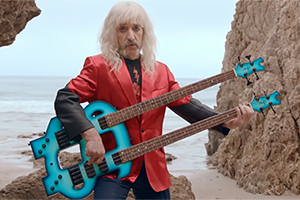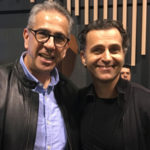Spinal Tap bassist returns with new solo venture
By Gary Graff
May 21, 2018
The return of Derek Smalls is no small thing. The Spinal Tap bassist — best-known for his misadventures with plastic stage pods, zucchinis (not cucumbers, people) and stage directions — has been absent for some time, since the group packed it in after its final world tour during 2009. He’s returned this spring, however, with Smalls Change, his long-awaited (by some, at least) second solo album, which features a massive guest list includes the Red Hot Chili Peppers’ Chad Smith, Paul Shaffer, Steve Vai, Joe Satriani, Steely Dan’s Donald Fagen, David Crosby, Toto’s Steve Lukather, Bon Jovi’s Phil X, Dweezil Zappa, Richard Thompson and many more. Smalls (who most know as the alter-ego created by actor Harry Shearer) has also been playing some shows this year — with symphonies no less — and presumably finding his way to the stage easier than he did in the halcyon days of his band…
FBPO: It’s been a minute. Where have you been?
Smalls: Well, when the band — I don’t want to say split up because it’s not like all the fractious infighting and name-calling and furniture throwing you hear about. It’s more like…do you remember Pangea? All of a sudden you’re looking at Pangea, and then there’s South America and Africa instead. That’s what it was like. So that happened and I was in Albania hanging out with my friend Eddie from the near death metal band Chainsaw Vermin. He asked me to join the band and I thought to myself, “Derek” — because I call myself Derek — “this is where it ends. You’re the substitute bass player for Chainsaw Vermin.”
FBPO: But it’s not where it ended.
Smalls: No, that’s right. I saw a notice from the British Fund For Ageing Rockers, giving grants to aging rockers. If that’s not me, I don’t know who I am. So I applied and they gave me a big grant and I had to come up with a concept for the record, because the form has a big blank space that says, “What’s the concept for your project?”
FBPO: What was the concept?
Smalls: I was stumped for a while. Then I thought, “Wait a minute, they say you should always write what you know, so what do I know?” I mean, what DO I know? I’m getting older, I know about that. Let’s write about that — and by let’s, I mean me. I’m the only one of us in the room. Then it occurred to me people are going to say this is a narrow sort of demographic target, only writing about people who are getting older. So I said to myself – in response, as if in a debate except I’m still the only one in the room – “There’s only two kinds of people in the world, people getting older and dead people. So I was aiming to at only the more affluent part of that marketplace, the one that actually has the get-up and go to buy records.
FBPO: You have a lot of great guests on the album. How did you lure them all in?
Smalls: Increasingly persuasive phone calls. Increasingly urgent pleas and inquiries. There were no threats, really. And those were met by a spirit of such overwhelming generosity and almost love in response. One of the players – I don’t remember which one it was, specifically – summed it up in a few words; He said, ‘Sure, man. It’s like a pity fuck,’ and I took that to be a great compliment, as I’ve been on the other side of that myself.
FBPO: How does it feel to be back in the music biz again?
Smalls: It’s like a rebirth, without the squalling and the puking. It’s square one. It’s starting the game over again, like when you call ‘New game!’ in some games and then you start over again and you get to play with different rules because you’re the leader now.
FBPO: Smalls Change was co-produced by Harry Shearer. He’s got a rep as being a real piece of work.
Smalls: I never saw him. He puts his name on things. With him the ink is never dry…
FBPO: How did you start playing bass?
Smalls: It’s a great story – I hope you’ll agree. I was going to university kind of, sort of, called the London School of Design, back in the ‘60s. I went basically for the initials – LSD. I had a roommate at the dorm; He played guitar and he said, “Derek, pick up one of those and play along with me.” So I picked one up and said, “blimey, I’m gonna shred my fingers if I do this!” So he said, “Pick up that big one in the corner” – it was a little plywood Japanese bass. I said, “The strings feel much better, and there are fewer of them. I can follow this.” That was really the start.
FBPO: Who were your influences?
Smalls: Well, McCartney. You’d listen to McCartney; He was all over the place. I listened to Entwistle – he was doing a different kind of playing, wasn’t he? Almost trying to be a jazzer in a rock ensemble, trying to overwhelm you with sound and notes. That’s one strategy. I was always looking for the well-chosen one note that just bends your head. Like the lost chord – I was looking for that one note to just go “boom!” right through you, no more.
FBPO: Is your Spinal Tap history a blessing or a curse?
Smalls: It’s both an albatross and a tuna. It’s a good thing because I’m known and people will recognize me. It’s a bad thing because they’ll recognize me and it’s, “Oh, are you wearing the cucumber in the trousers tonight” or “I see you got out of the pod,” ridicule like that.
FBPO: At least you’ve made your mark.
Smalls: You can say that, but…You know, if you give it a moment’s thought about light-gauge aluminum foil and tight trouser fabric, a cucumber surface is going to be revealed to be far too warty for the desired effect. You need the smoothness of the zucchini. You would never use a cucumber in that occasion. But that was misinterpreted as something I need to do, that I had problems. Actually I never had a problem with it, but we were embarking at the time on our largest tour, our first real American tour, bigger houses than we ever played, and I said to myself “Derek” — ’cause I call myself Derek — “I said, Derek, maybe a little stage right, a little nervousness might impinge so maybe an insurance policy is in order.” That’s what it was – lan insurance policy.
FBPO: You’ve been doing your own shows, with orchestras. Have you requested detailed maps to the stage at those venues, also as an insurance policy?
Smalls: (sighs) That happened once. Once! It happened to be documented by somebody who was doing a hatchet job on the band as opposed to a fair-minded documentary. It never shows you all the times we found the stage. And on that tour, just to pick an example — I’ll be approximate – about 90.0427 percent of the time we found our way to the stage straightaway. You didn’t see it in the film, did you? You ask yourself, “Why not? Did he have an agenda?”
FBPO: Will we ever see Tap back together?
Smalls: Well, is Pangea gonna get back together? That would be my question to you. Is South America going to merge with Africa again? If you can tell me the answer to that, I can tell you the answer to your question.





